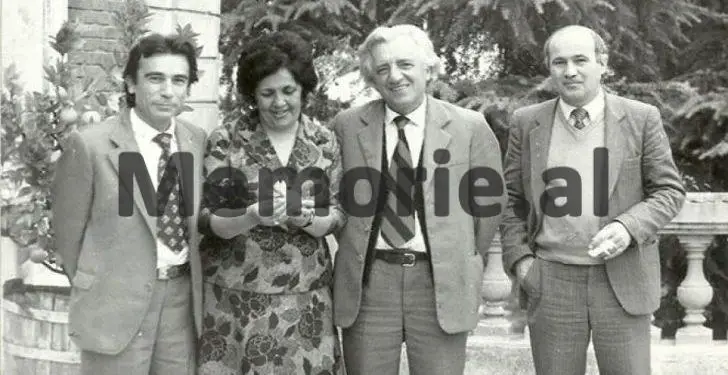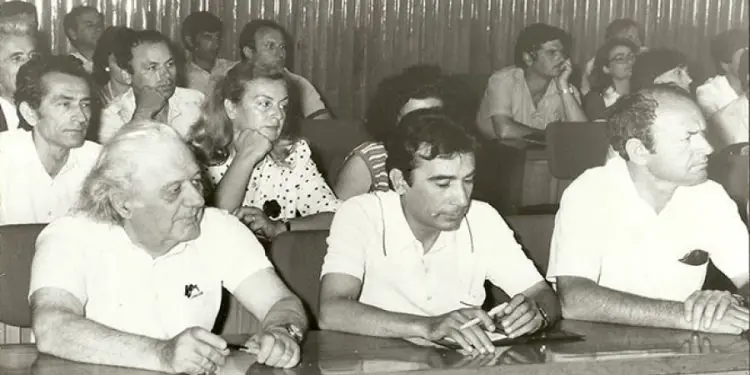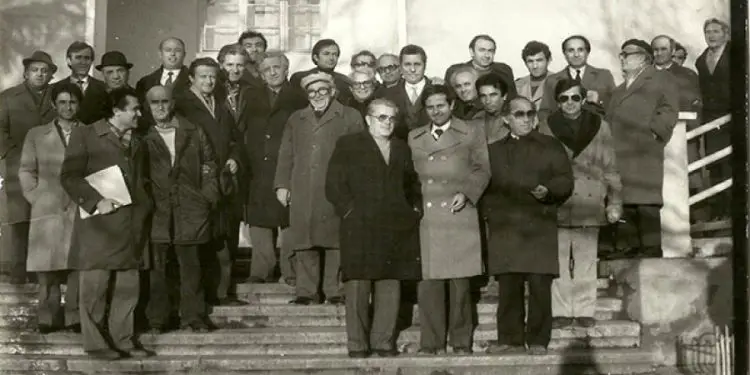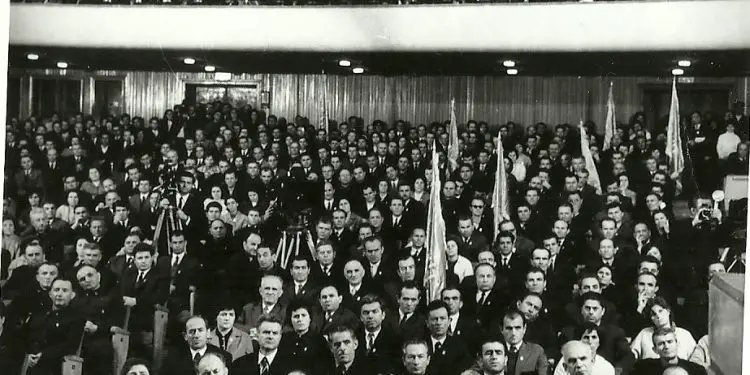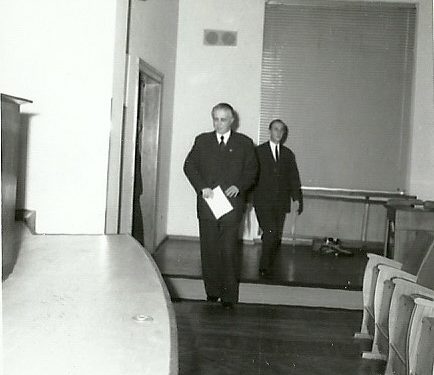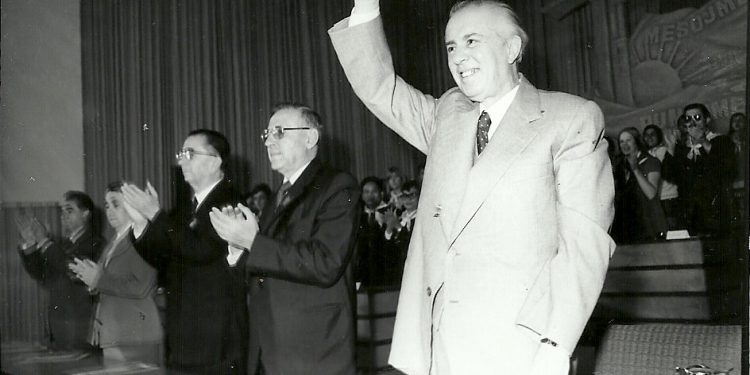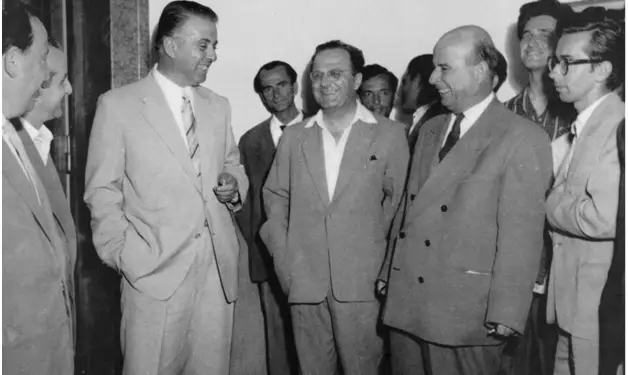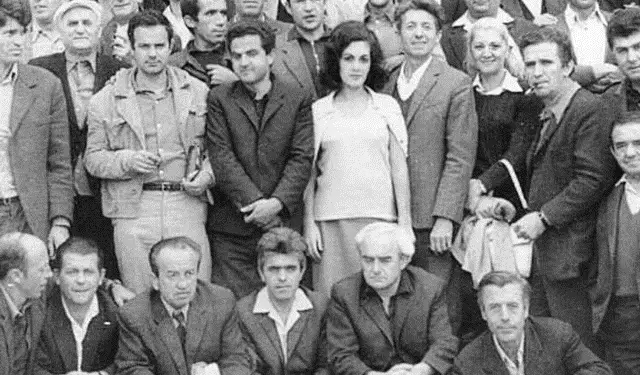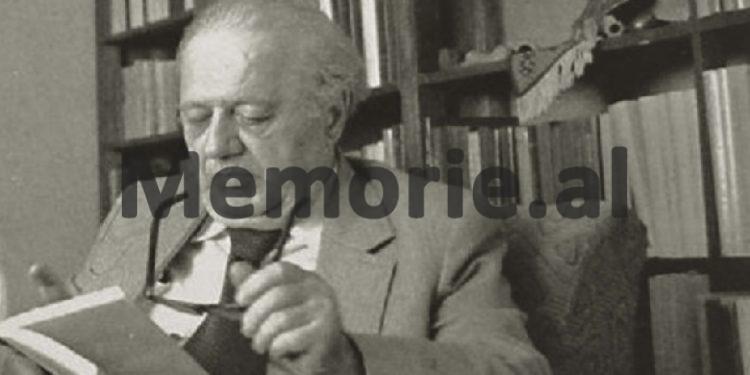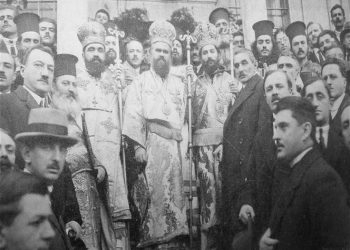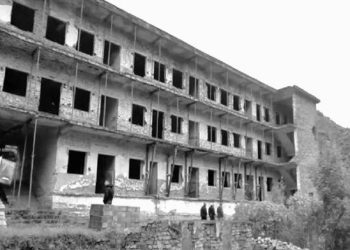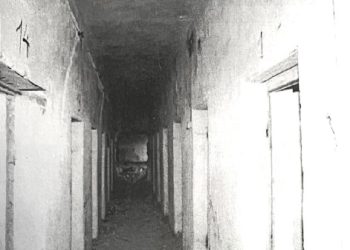Dashnor Kaloçi
Second part
Memorie.al publishes some archival documents issued by the Central State Archive in Tirana (fund of the former Central Committee of the ALP), which belong to June 1973, when the IV Plenum of the Committee was held in Tirana Central of the ALP, where Enver Hoxha held the main report on “To deepen the ideological struggle against foreign performances and liberal attitudes towards them.” The unknown speech of Enver Hoxha, which was held mainly only for art and culture and became the “guillotine” of writers and artists, as there were “cut off many heads” of them, being initially fired from the duties and functions they had had until then, to end up in the most remote villages of Albania, in mines and construction sites, as well as prisons and internments of the communist regime of Enver Hoxha, such as: Fadil Paçrami, Todi Lubonja, Mihallaq Luarasi, Lluk Kaçaj, Sherif Merdani, Minush Jero, Kujtim Spahivogli, Ibrahim Uruçi, Dhimitër Shuteriqi, Edi Luarasi, Zhani Ciko, Leka Bungo, Bujar Kapexhiu, Novruz Yzeiri, Dorjan Nini, Francesk Radi, Justina Aliaj, Vilson Kilica, Hamide Stringa, etc.
“Phenomena of this nature have been observed in light music, especially in rhythmic music, where there have been deformations of the clear melodic line and the way has been opened to unbridled rhythms. This was especially evident at the 11th Radio-Television Song Festival. Our whole social opinion indignantly rejected that vulgar music, those despised songs and that snobbish performance that this festival brought us on stage. He rightly considers and condemns it as an insult to the best national tradition, popular spirit and partisanship of our art. Such foreign performances have also appeared in some paintings, in the stage presentation of a theatrical and operatic work, on the covers of books, etc. Such deviations have directly affected both the form and the interior of our literature and art. These perverse tendencies are at odds with the partisanship of literature and art, with their formative and educational role, with their popular and national character. “They put a barrier between art and the people, fade the democratic nature that our art should have, spoil the tastes of the working masses.”
This is what Enver Hoxha said, among other things, in his speech held at the IV Plenum of the Central Committee of the ALP, which took place on June 26 and 27, 1973, which was held mainly only for the art of culture and became the “guillotine” of writers and artists, as it “cut off many heads” of them, initially being dismissed from the tasks and functions they had held until then, to then end up in the most remote villages of Albania, in mines and construction sites, as well as prisons and internments of the communist regime of Enver Hoxha, such as: Fadil Paçrami, Todi Lubonja, Mihallaq Luarasi, Lluk Kaçaj, Sherif Merdani, Minush Jero, Ibrahim Uruçi, Dhimitër Shuteriqi, Edi Luarasi, Zhani Ciko, Leka Bungo, Bujar Kapexhiu, Novruz Yzeiri, Dorjan Nini, Francesk Radi, Justina Aliaj, Vilson Kilica, Hamide Stringa, etc., where most of them were released from prison or returned to Tirana only after the fall of the regime communist in the early 1990s.
For more than what was said by Enver Hoxha in the IV Plenum of the Central Committee of the ALP, we know the archival document that Memorie.al is publishing for the first time in several parts (with some abbreviations), starting from today’s writing.
Speech of Enver Hoxha at the IV Plenum of the Central Committee of the ALP, held in Tirana on 26 and 27 June 1973
Continued from the previous issue
The imperialist bourgeoisie has always tried to denigrate or eradicate the cultural traditions of the small peoples, the national spirit of their art and culture. This is one of the ways to realize its cultural aggression and subjugation of peoples. The reactionary bourgeois concept of the “internationalization” of culture and art, the notion that “the stage of national schools has already passed”, aims at the extinction of the cultures of other peoples. In these conditions, the struggle to preserve the national physiognomy of art, the cultural wealth of the people becomes even more imperative for us. In fighting for the protection of the national spirit of literature and art, we always strongly emphasize their revolutionary and socialist character. The creative development of socialist realism has also encountered several misinterpretations and theories of different origins. Especially these have appeared in the treatment of the problem of contradictions and the hero in art.
It has happened that the contradictions of our society have been presented without a way out, with a dark sense of pessimism, which is typical of bourgeois-revisionist conceptions. The supremacy of the forces and of the socialist ideal has not always been properly demonstrated. There have also been cases of confusion of contradictions among the people with the contradictions between us and our enemies. This leads to serious principled errors, where Fadil Paçrami tried to introduce our art, when he said that we have dealt a lot so far with the war between “us and the enemies” and that from now on we should talk mainly about the war “between us”. So, let us leave our enemies alone and treat our people as such. The party has emphasized that the discovery of contradictions and their reflection in art, including the critique of negative phenomena, must be done right, from the positions of proletarian partisanship, with the aim of overcoming them and society moving forward and not remaining in the grip. of contradictions.
On the other hand, those theories that have been made about the positive hero, about his fragmentation, about his identification with everything, about the artificial division into “traditional hero” and “innovative hero”, etc., are nothing but views that lead to DE heroization in literature and art, to departure from life and man. Even schematic theorizing about the hero, conceived idyllic and sentimental, are also harmful and take art away from truth and realism. Criticizing the schematic meaning of a book-idealized hero, without relying on our reality, at the same time we can in no way accept the new scheme for a wavering hero, which is in fact an open influence bourgeois-revisionist. These views and attitudes have nothing to do with our principles, they show a theoretical confusion. These were some problems that have worried the Party, the employees of all creators, regarding the development in the right way of our literature and arts, in the fight against the influences of foreign ideology.
The slips in literature and art are also related to the insufficient work of the Tirana District Party Committee, where most of the writers and artists are militant and the main artistic institutions of the country are located, in which, more than anywhere, the spirit was spread of liberalism. In this regard, the former secretary for propaganda, Fadil Paçrami, has had a very detrimental effect, who for the problems of literature, arts and artistic institutions of the city, had managed to impose himself on the Party Committee of Tirana. Fadil Paçrami had foreign views on these problems, contrary to the Party line, which have also appeared in his literary creativity. With his strong liberal predispositions, with foreign theorizing, he denied and fought the sound traditions of literature and the arts, fostered the artificial division between generations of creators and preached the war between them, encouraged and supported the spread of influences and performances modernist foreign. With his liberal-anarchist tendencies, expressed in right-wing conceptions of problems and in the use of aggressive methods, applied with arrogance and arrogance, he has exerted a very negative influence on the Writers ‘and Artists’ League and on literary and artistic life. of the capital.
Fadil Paçrami’s anti-party views have manifested themselves not only in the non-implementation of the Party line for the war on both sides, but also in its open opposition, fighting from foreign positions only against conservatism. In fact, as a right-wing deviant, he has fought to pave the way for liberalism. In his work he has violated the norms of the Party. He has been arrogantly ignored by the communists, the apparatus and the Secretariat of the Central Committee of the Party. Being against the Party line and against the Party itself, he has displaced grassroots organizations in the field of culture and implemented a personal cadre policy, aiming for the leadership here to be carried out not by the Party but by the people who suited him.
Fadil Paçrami and Todi Lubonja, as anti-party elements, in fact had the same goals and followed a path to hit the Party and its leadership. The Ministry of Education and Culture bears a great responsibility for the slips from the Party line in art and literature, because it has underestimated the danger of liberalism and has succumbed to liberal pressures. Therefore, it must review its work in this direction and take measures for the full and correct implementation of the tasks assigned to the direction of the entire cultural and artistic life of the country, without making any concessions to anyone who violates the Party line in issues of our socialist literature, art and culture. The Writers ‘and Artists’ League bears a particularly great responsibility for the slips from the Party line in the field of arts and literature, with its main leading comrades. Many concepts and theories that were criticized above have found refuge in the activity of the association, in its press organs, especially in the newspaper “Drita”. Claiming that only they know the problems of literature and art and their specificity, the leading comrades of the league not only did not fight against foreign influences, but often, with their intentions, fed them. The League of Writers and Artists must deeply analyze its work, reveal any distortion of the Party line in literature and art, take serious and responsible measures to prevent the emergence of bourgeois and revisionist ideology in the sphere of activity. its.
But in recent years, when a strong blow was given to the old religious, feudal and patriarchal-conservative concepts and prejudices, the struggle against the present influences of bourgeois and revisionist ideology, against their manifestations in life, was somewhat neglected and underestimated. our. Liberal concepts and attitudes appeared, which paved the way for some harmful phenomena that began to appear in some people and especially in some young people. Those influences, of which we have spoken in literature and in art, cannot be seen detached from some foreign performances, which have been observed in the tastes of some young people, in their misconduct and inappropriate actions. These, as well as the constant external pressure, are the basic causes of the spread of some foreign and vulgar tastes for music and art, of the pursuit of extravagant and ugly fashions, of unpleasant behaviors contrary to socialist ethics and the positive traditions of the people. .
Rightly, our social opinion hit hard on the bastardized “imports” of long hair, extravagant clothes, shouts of jungle music, nonsense, skinless behavior, etc. If the influences and manifestations of the bourgeois-revisionist way of life are not fought from the embryo, they open the way for the disintegration and degeneration of the people, who are so dangerous to the cause of socialism. The all-round spiritual development and moral figure of our young man cannot be understood without the formation of sound ideo-aesthetic tastes for beauty in art, in nature, at work and in life. The issue of tastes is not a purely personal matter of individuals, which’s supposedly cannot even be discussed. Despite the presence of the individual element in them, tastes always have a social character, they are formed under the direct influence of socio-economic relations, ideology and culture, social psychology. Hence the class character that they have. Therefore, our tastes are at their core completely opposite to those of the bourgeois-revisionists.
We should also draw attention here that foreign performances have penetrated especially in cultural and artistic institutions. Foreign liberal-modernist influences from literary and artistic creativity have also passed on the stages of theaters and variety shows, on cinema and television screens, on various activities of clubs, houses and centers of culture. In many cultural institutions that extend to the grassroots, there is also a tendency to underestimate the reliance on sound national and popular traditions in cultural activity. We have also had disturbing phenomena in the way we behave and live. There have been many violations of social discipline at work and at school, disregard for the norms of socialist morality and state laws, violations of public and personal order, display of immorality, ignoring the social obligations that people have as employees, as citizens, as parents and family.
Especially in a number of young people, some very negative phenomena started to appear, such as dropping out of school, being unemployed, robbery, theft, etc. All of these ‘nurtured the tendencies of parasitism, individualistic and extortionate tendencies at the expense of society, as well as unjust claims. The bearers of these foreign shows, who lived a life outside the people’s war, have been the most predisposed contingent for acts of vagrancy and crimes, as it is known that parasitism and extortionate tendencies are a source of moral degeneration of people. Of course, if we consider what is happening in the capitalist and revisionist world, these phenomena in our country are quite limited. But our healthy society is and always should be concerned about such phenomena, even if these are very few, even in isolated individuals, because we strive to maintain a clean and healthy conscience and moral image of every employee, to keep our whole socialist society clean.
Ideological purity has been and remains the basic principle of our popular and partisan press. But recently in some organs, such as in the newspaper “Drita” and “Zeri i rinisë”, in the magazine “Nëntori” and in some publications of the publishing house “Naim Frashëri” have appeared a series of literary-artistic creations and critical writings with ideas, foreign concepts and theorizing, with modernist liberal tendencies and other decadent phenomena, incompatible with our ideology and culture. These have created confusion in the minds, feelings and tastes of the working masses and especially the youth. The omissions that have been made in the various press organs bring a great deal of damage, because through them the foreign bourgeois-revisionist influences introduced smuggled, not only gain, so to speak, the “right of citizenship”, they are spreading in a way rapid and massive in all categories of the population. Party lines and directives must be applied intransigently and consistently in the press.
Every writing, every material published in the pages of newspapers, magazines and books must be permeated by Marxist-Leninist ideology, to serve the comprehensive communist education of the masses, the formation of the new man of socialist society. The press, as to this day, must inspire measures for the lofty goals of building socialism and defending the homeland. He must raise the revolutionary militant spirit and strike hard at foreign influences of any kind and from any side to come. He must expose the bourgeois and revisionist order, their anti-popular and aggressive policy, their decadent ideology and culture, reveal the social wounds and show the all-round decay of the system. The special place occupied by radio and television in the Party propaganda system is known. .
Our Party-led Radio and Television has made significant progress year after year. In its entirety, his work is characterized by the efforts of the communists and all employees to increase the role of this institution in the political, cultural and artistic life of the country to propagate the Marxist-Leninist line of the Party, the progress. of socialist Albania. However, it should be noted that, especially in the last year, in the music, cultural and artistic programs of Radio-Television, the revolutionary spirit, the socialist content and the national character were gradually weakened. These deviations were reflected in the copying of foreign ways and forms of construction and presentation of various television programs, in the indiscriminate transmission of political and ideo-aesthetic criteria of foreign songs, in the encouragement of the creation and propaganda of modernist songs that imitated music. Western. Thus Radio-Television programs began to detach themselves from the spiritual demands of the broad working masses, especially the youth, and to become conductors of foreign tastes and morals, liked only by a category of snobbyists.
This foreign product for life, for the ideology of our culture was expressed in a synthesized way at the 11th Song Festival on Radio-Television. A great responsibility for these deviations from the Party line on Radio-Television bears Todi Lubonja, former director of this institution, who as a right-wing deviant has manifested and supported strong liberal opportunistic views, modernist aesthetic taste and applied methods foreign direction. He tried to give Radio-Television a purely informative and cultural-entertaining direction, a direction which was contrary to the orientations of the Central Committee of the Party, for its political, ideological and cultural-educational character. Todi Lubonja, both as the former secretary of the Party Committee of the Korça District, and as the director of the Radio-Television, has been characterized by arrogance. He, being on the same anti-party path as Fadil Paçrami and, pursuing the same goals against the Party, has been against the Party line and has worked to distort it.
He has removed the basic organization of Radio-Television from the ideological, political and organizational leadership of this institution, has pursued a personal policy of staffing, gathering around himself people who he deemed suitable for the implementation of his views and tastes. In this way he severely damaged the activity of this important institution and generally the work of the Party for the ideo-aesthetic education of the masses, especially the youth. The party has taken measures to eliminate foreign influences on Radio-Television. The situation there has improved, but much remains to be done to make radio, especially television, fully implement the great tasks entrusted by the Party to this great propaganda and cultural center for the comprehensive education of the masses and the formation of its features as a television. revolutionary, socialist and Albanian. Our new Television will create these features not by imitating and copying the programs and presentation forms of foreign televisions. A clear demarcation line must separate our television from that of bourgeois-revisionist countries. The path of its development is that of the Party, of the people, of socialism and of revolution. The Party and the Government will support and encourage, as always, the efforts of the employees of Radio-Television for the new, for the beautiful, the diverse, for programs that truly reflect the rapid dynamic development of our society, for programs that respond to the educational-cultural demands of the ever-increasing aesthetic tastes of the working masses, especially the youth./Memorie.al
Continues in the next issue




